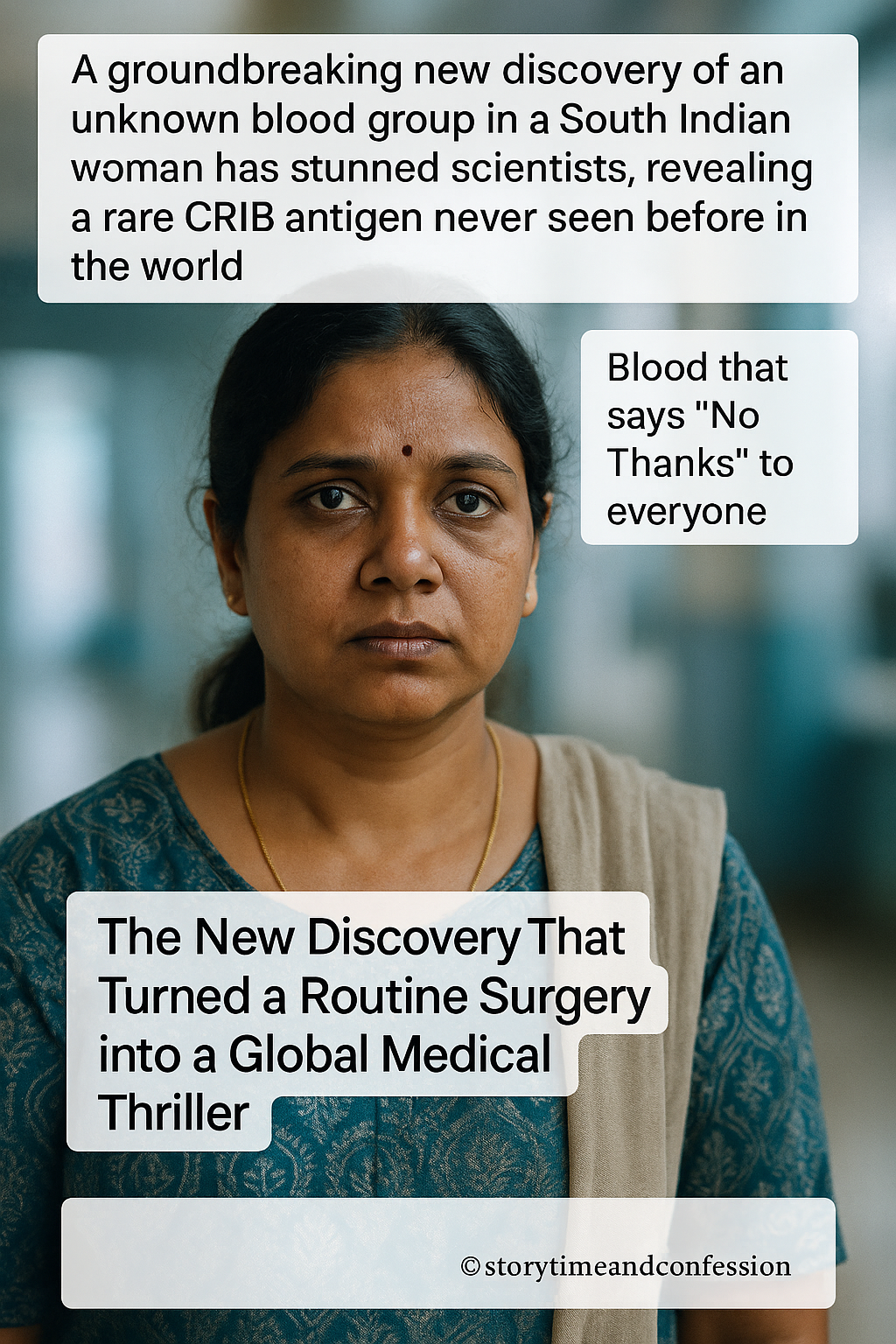A groundbreaking new discovery of an unknown blood group in a South Indian woman has stunned scientists, revealing a rare CRIB antigen never seen before in the world.
The New Discovery That Turned a Routine Surgery into a Global Medical Thriller
Hospitals are usually pretty good at finding blood for patients. You walk in, you bleed a little, they patch you up, and life goes on. But when a 38-year-old woman from Kolar, Karnataka, was admitted for cardiac surgery, her blood had other plans. Despite having O Rh+, the “default” setting in humanity’s bloodstream, not a single O-positive blood unit was willing to cooperate.
Cue the frantic phone calls, the lab coats running in slow motion, and a case being escalated faster than a WhatsApp family group argument. The Advanced Immunohematology Reference Laboratory at Rotary Bangalore TTK Blood Centre took charge, expecting a routine rare blood case. What they found was a new discovery that had never bled on any textbook page before.
Blood That Says “No Thanks” to Everyone
Using high-tech serological techniques (read: poking the blood in sophisticated ways), scientists realized her blood was “panreactive” — which is just a fancy way of saying it politely rejected every blood sample, like an exclusive VIP at a party with no guest list.
Testing 20 family members didn’t help either. Apparently, her blood had commitment issues with them too.
The New Discovery of the CRIB Antigen: India Writes Its Name in Blood (Literally)
You’d think finding a rare blood type is like winning a genetic lottery. Except, in this case, the prize was a global medical mystery. After ten months of poking, prodding, and probably a few sleepless nights, researchers at the International Blood Group Reference Laboratory (IBGRL) in Bristol, UK, made a groundbreaking new discovery: a blood group antigen never seen before.
And it’s got a name with local flavour — CRIB. ‘CR’ for Cromer (the blood group system it belongs to), and ‘IB’ for India and Bangalore. That’s right, this antigen is proudly desi.
CRIB: When Your Blood Decides to Be a Trendsetter
The 35th Regional Congress of the International Society of Blood Transfusion (ISBT) in Milan, Italy, became the stage for this global reveal. For the first time in history, the world witnessed a person walking around with the CRIB antigen — a badge of biological uniqueness no one saw coming.
Dr Ankit Mathur from Rotary Bangalore TTK Blood Centre summed it up with understated elegance: “We had to manage her surgery without a transfusion.” Translation: They performed a cardiac surgery with zero compatible blood bags, pure nerves, and a pinch of scientific audacity.
New Discovery Spurs Global Hunt for Rare Blood Donors
The CRIB case has set off alarms in transfusion labs worldwide. Rotary Bangalore TTK Blood Centre, not ones to rest after dropping such a bombshell, has now launched a Rare Donor Registry in partnership with the Karnataka State Blood Transfusion Council, ICMR, and the International Society of Blood Transfusion.
Also Read: Read Latest News Online: NYC Gunman Targets NFL, Forgets How Elevators Work, Ends in Tragedy
Not Their First Blood Rodeo
Dr Mathur isn’t new to bizarre blood tales. The centre has previously dealt with ultra-rare cases like D- -, Rh null, and In b negative. Each of these cases is a chapter in a global saga of blood types that prefer to live off-the-grid.
But the CRIB antigen is different. It’s not just rare; it’s unprecedented. It’s like discovering a new color that nobody has ever seen, but with the added pressure of needing it to save lives.
The Future of Blood Transfusions After This New Discovery
What does this mean for the future? For one, blood banks are now scrambling to ensure they don’t miss out on detecting the next CRIB-like phenomenon. The era of casually labeling people as “O Positive” might just be over.
Will the CRIB Antigen Rewrite Medical Textbooks?
This new discovery challenges long-held assumptions about blood group systems. It’s a scientific wake-up call that there’s more to our veins than meets the microscope. The CRIB antigen is not just a badge of honor for India; it’s a puzzle piece that could reshape how we understand immunohematology.
The Patient Who Redefined “Unique Bloodline”
As for the woman from Kolar? She’s now a global medical celebrity, albeit unknowingly. Her blood, once a cause of frantic lab work, has now become a symbol of how the human body still has secrets up its sleeve (or in this case, bloodstream).
Also read: The Confessions: A True Tale of Marriage, Betrayal, and a Vicious Legal Scam
Follow Us On Social Media:



1 thought on “The New Discovery That Left Scientists Bloodless: Kolar Woman Has a Blood Type No One Knew Existed”